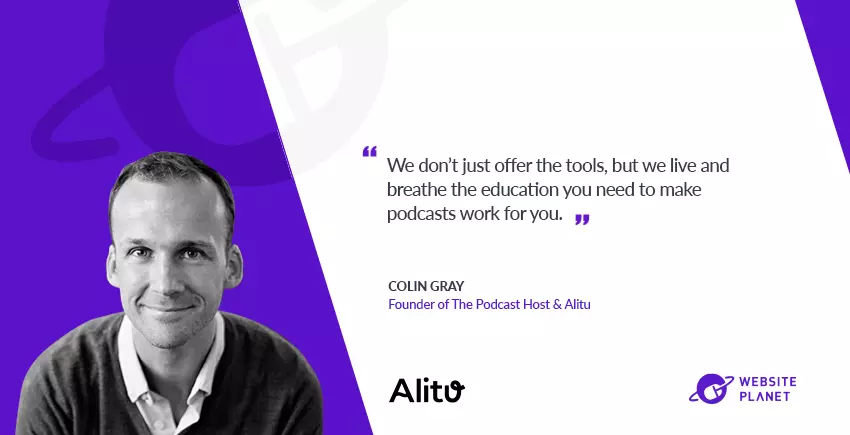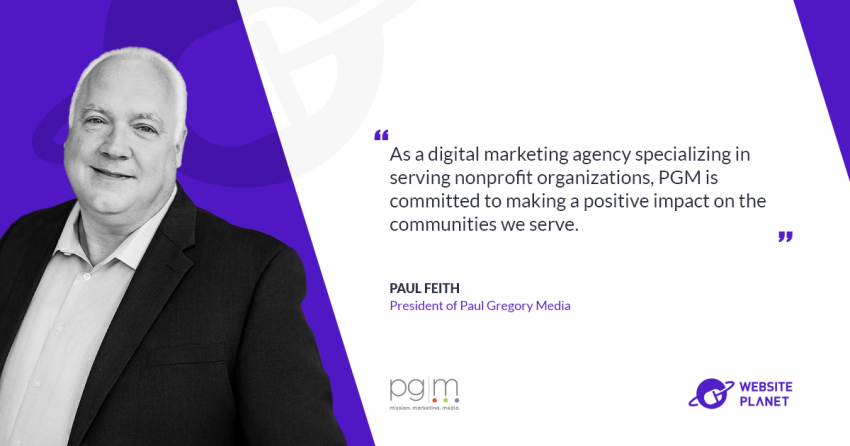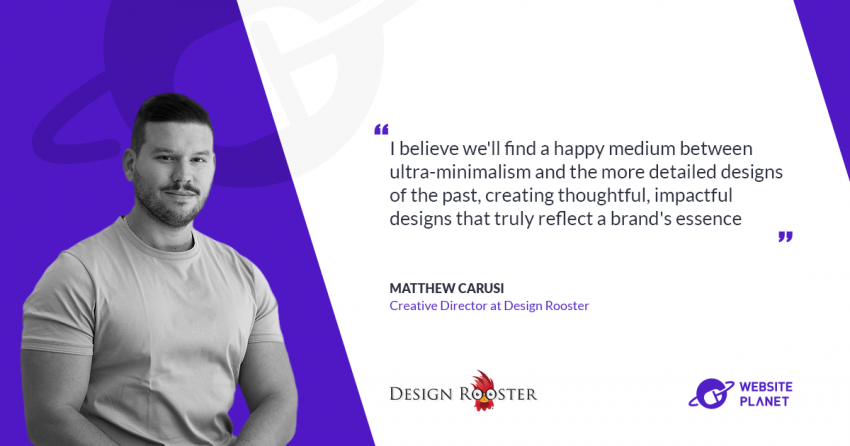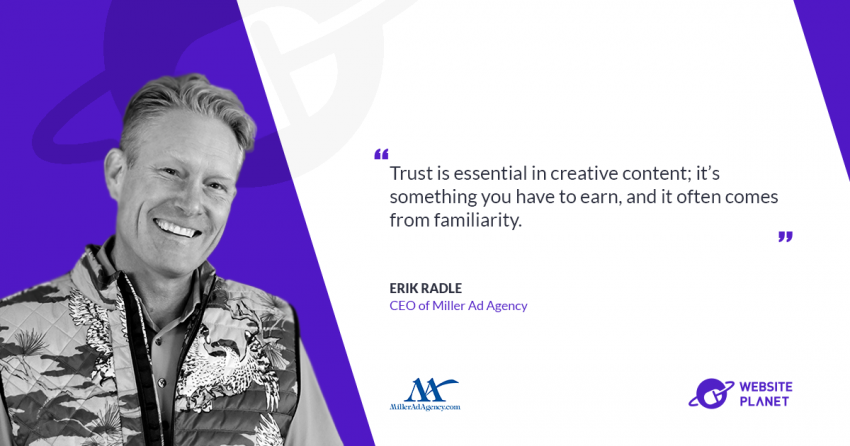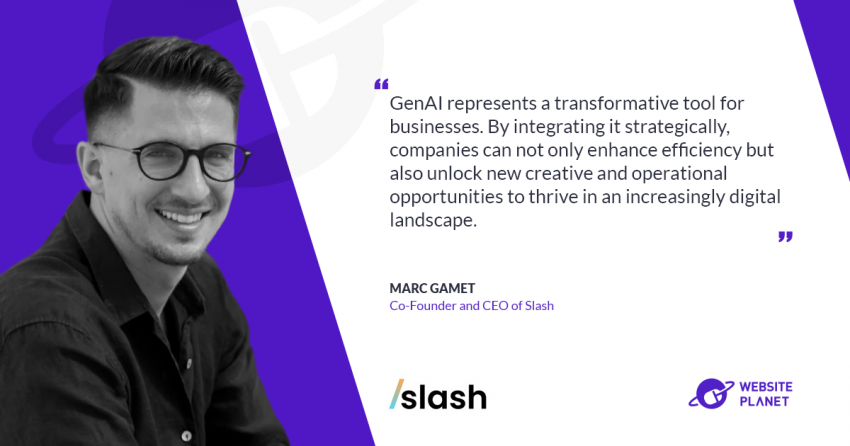Website Planet had the chance to sit down and chat with Colin Gray, international speaker and founder of The Podcast Host, probably the most complete online resource on how to create a podcast, and today we will look at his last creation:
Alitu, an all-in-one solution to record, edit and host a podcast.
We discussed how Alitu started, the pain points they solve for podcasters, and what makes it stand out from other podcasting apps.
What’s your story, and how did you get into podcasting?
My background is in university education – I taught lecturers how to use technology in their teaching. Of course, one of the up and coming new mediums back in 2006 or 2007 was podcasting, so I started to look into it as a teaching tool, and I just fell in love with the medium! I loved the magic combination of in-depth, long form content with the intimacy and personality that it offers, too. So, I started teaching it in the uni, as a teaching tool.
Later, I started to write about everything I was learning, and that became thePodcastHost.com, which is the whole basis for our business now, really.
What inspired you to create Alitu, and how did you validate the idea?
A few years into running thepodcasthost.com, we were lucky enough to have grown a really engaged and interesting audience. We constantly asked for feedback from them, that’s what powered all of our content:
“What are you struggling with? What do you want to learn more about?” And one of the biggest, most common problems we always heard was: “How can I make editing easier? I don’t want to learn this horribly complicated audio engineering package! Why does it take so loooong??”
We obviously had 100s of hours of audio editing under our belt at that point, so I started to look into whether we could automate some of the processes involved.
We ended up creating a guided editing process as the first version of Alitu – top and tail, then splitting, then cutting. And it would do audio cleanup, and add your music and transitions automatically. The validation at that point was just the sheer number of questions we got about the issue. But then, when we were ready to launch our first version, I just sent that very early version out to all of the people who had sent us that question about editing, and asked if they wanted to try it.
The response was an emphatic yes!
What is Alitu, and how does it work?
Alitu is a tool that simplifies the craft of making a podcast, from start to finish. It started out as a tool to help with editing, but now it actually does the whole end-to-end podcasting process, including recording both solo and online calls, audio cleanup, transcriptions, audio editing, adding theme music and transitions, piecing the whole episode together, and then publishing to our in-built podcast hosting.
On top of that, Alitu can also act as a hub for your podcast, and tie in with just about any other podcasting platform you choose to work with. So you can record and edit with Alitu, but host with a specialist hosting platform. Or record elsewhere, and upload those recordings to Alitu for cleanup and editing.
The aim is to automate as much as possible, and help with the rest, so it’s as quick and easy as possible to make a great quality show.
How does your mission differ from the other podcasting solutions?
I think there are two parts:
- We simplify and clarify as much as possible, deliberately choosing to automate some things, or remove others from the process, in the favor of a quicker, high quality workflow.So, we’re not for everyone. If you want control over every detail of your show – eg. you’re making a high production audio drama, or you want to edit out every last um and ah, then you’re probably better with a DAW platform.But, if you want to concentrate on what you do best – sharing your message – and let us help you run an efficient, high quality workflow, then we’re for you.
- We thrive on education. Before there was Alitu, there was thePodcastHost, and there we teach! We have many 100s of free articles, podcast episodes and youtube videos, all around running a successful show. And we also have a range of paid courses, all really in-depth and designed to hold your hand through every step.
So, we don’t just offer the tools, but we live and breathe the education you need to make podcasts work for you.
Who are your typical clients and what problems do they have when they come to you?
One of our most common customers are those who teach in some way, whether that’s a coach, a mentor, a consultant, or just a bona-fide school or university teacher!
They have so much to share and say on a show, and in many cases their living is tied up in growing their own personal brand, and particularly establishing credibility around their own knowledge. So, running a podcast is perfect for that.
And what makes them eventually choose you over your competitors?
Leading on from above, if your goal is to earn a living from your knowledge or your message, or even just grow a community around it, then there’s no real benefit in becoming an audio engineer.
Instead, you want to outsource the techie side, and concentrate on developing your content, and then marketing it to the world.
So,
many people choose Alitu because it gives them the control to create the show that fits their vision, but it takes so much of the work off your hands. That time and stress saving, our customers tell us, is well worth paying for in a platform like Alitu.
Can you share one success story from your customers? What was their pain point, and what results did they get thanks to Alitu?
From a case study we’ve published – feel free to abridge:
When his hours were cut due to the COVID-19 pandemic, Dr. Kevin Pho suddenly found himself with a lot of free time on his hands. He decided to use this time to start a podcast and the results will really surprise you.
Dr. Kevin Pho, is the founder of KevinMD.com. Since 2004, physicians, advanced practitioners, nurses, medical students, and patients have been telling their stories on the site about the challenges they face in our country’s healthcare system.
In 2020, like many other primary care physicians, Dr. Pho was furloughed because his clinic was seeing fewer patients due to the pandemic. It’s strange to think of furloughing doctors in the middle of a health crisis, but that’s what happened.
Kevin had spent 17 years building a popular web platform, KevinMD.com, which receives over 3 Million monthly page views and has over 250,000 followers on Twitter and Facebook. The success of the website was awesome, but Dr. Pho wanted to find new ways to engage his audience where they live and play.
When you’re faced with a workplace change that’s out of your control, what do you do? What’s a passionate doctor to do when he finds himself with pandemic-induced free time and a desire to keep building his platform? I bet you can guess the answer…
Dr. Pho had always wanted to start a podcast but didn’t know where to begin so he did a lot of reading and research on podcasting, until he finally decided to start his daily podcast, The Podcast by KevinMD, by inviting guest writers from KevinMD.com to share their stories on his show.
His aim was to create a show that was digestible and full of stories from the world of healthcare. His plan was to create daily 15-20 minute episodes that were easy to listen to in the car or on the treadmill.
Dr. Pho believes that the strength of his show is that he allows his guests to tell their stories in their own words. And it’s so much more powerful when they can have a direct connection to his audience rather than just reading their stories on the website.
Dr. Pho’s research and instincts about expanding his platform were spot on. Within an hour of emailing his writers to let them know about his new podcast he had all his podcasting spots for 2020 filled! He now has a waitlist of over 300 people who want to be a guest on his show!
What challenges and opportunities do you see in the future of the podcasting industry, and how do you plan to cope?
I think the buzzword right now is AI, so we’re certainly looking into how that’s going to affect us. I don’t believe it’ll have quite the negative effect on our industry that some people do. In fact, I think podcasting is well placed to become one of the few places that we can consume content in the future, REAL human to human content.
Yes, it’s possible even to generate a voice using AI – I’ve heard reasonably convincing shows which are purely AI driven – but it’s well inside the uncanny valley. It just doesn’t sound right. And that last 5% will take far, far longer to solve than the time it’s taken to get us here.
I think it can be a great assistant, though. Taking our transcripts and turning them into summaries, timecode guides, takeaways and social media quotes. All of that is great, allowing us to offer up our content in alternative formats without much work. As a planning tool, too, researching topics or guests, for example, it’s becoming really, really useful. So, we’ll be looking to build some tools like that into Alitu in the future.
